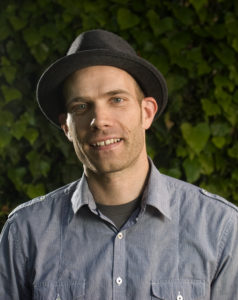 Chris Baty founded National Novel Writing Month in 1999, and oversaw the event’s growth from 21 friends to more than 300,000 writers in 90 countries. Chris now serves as a Board Member Emeritus for NaNoWriMo, and spends his days teaching classes at Stanford University’s Writer’s Studio, helping Dropbox with content strategy, and endlessly revising his own novels. He’s the author of No Plot? No Problem! and the co-author of Ready, Set, Novel. His quest for the perfect cup of coffee is ongoing, and will likely kill him someday.
Chris Baty founded National Novel Writing Month in 1999, and oversaw the event’s growth from 21 friends to more than 300,000 writers in 90 countries. Chris now serves as a Board Member Emeritus for NaNoWriMo, and spends his days teaching classes at Stanford University’s Writer’s Studio, helping Dropbox with content strategy, and endlessly revising his own novels. He’s the author of No Plot? No Problem! and the co-author of Ready, Set, Novel. His quest for the perfect cup of coffee is ongoing, and will likely kill him someday.
Chris judged the novel-in-progress category for the 2016 William Faulkner-William Wisdom Creative Writing Competition. Chris will present the winner he has selected at Faulkner for All on November 12, 2016.
NaNoWriMo
National Novel Writing Month (NaNoWriMo) brings together more than 300,000 writers from around the world to tackle the formidable task of writing 50,000 words during the month of November. It’s a “fun, seat-of-your-pants approach to creative writing,” according to NaNoWriMo, “valuing enthusiasm, determination, and a deadline.”

Participants (known collectively as “Wrimos:) can work independently or join one of the 615 regions worldwide. These regions are led by Municipal Liaisons, who coordinate “write-ins” through the Come Write In program, connecting Wrimos to libraries, bookstores, coffee shops, and other locales. In these neighborhood spaces, Wrimos meet up to encourage one another, commiserate about the challenge of writing an average of 1,667 words per day for 30 days in a row, and challenge each other with word sprints and writing prompts to get the maximum number of words onto the page. The whole crazy enterprise resulted in more than 1 million words being written worldwide in November 2015.
Participants have gone on to publish more than 250 novels in traditional print form, including Sara Gruen’s Water for Elephants, Erin Morgenstern’s The Night Circus, Hugh Howey’s Wool, Rainbow Rowell’s Fangirl, Jason Hough’s The Darwin Elevator, and Marissa Meyer’s Cinder.
In addition to November’s seat-of-your-pants writing adventure, Wrimos participate in the “Now What?” months in January and February, during which revision is the task at hand. In April, Wrimos reconvene for Camp NaNoWriMo, a virtual writing retreat where all projects are welcome, from novels to stories to poetry.
NaNoWriMo also created The Young Writers Program to promote creative writing in K-12 classrooms. The program provides free classroom kits, writing workbooks, Common Core-aligned curricula, and virtual class management tools to more than 2,000 educators from Dubai to Boston.
NaNoWriMo is a 501(c)(3) nonprofit organization that believes stories matter. For more information, visit www.nanowrimo.org.